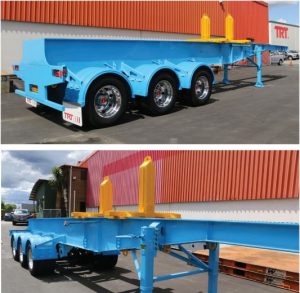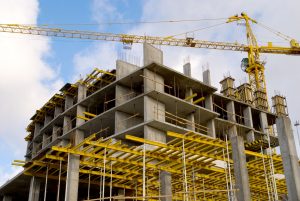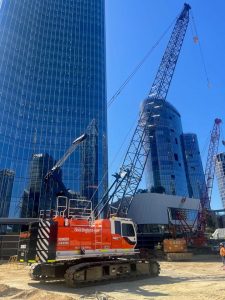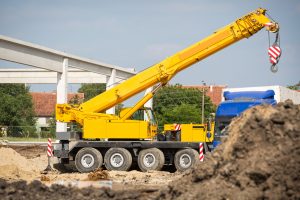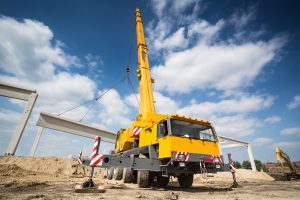How To Choose The Right Crane Trailer For Your Project
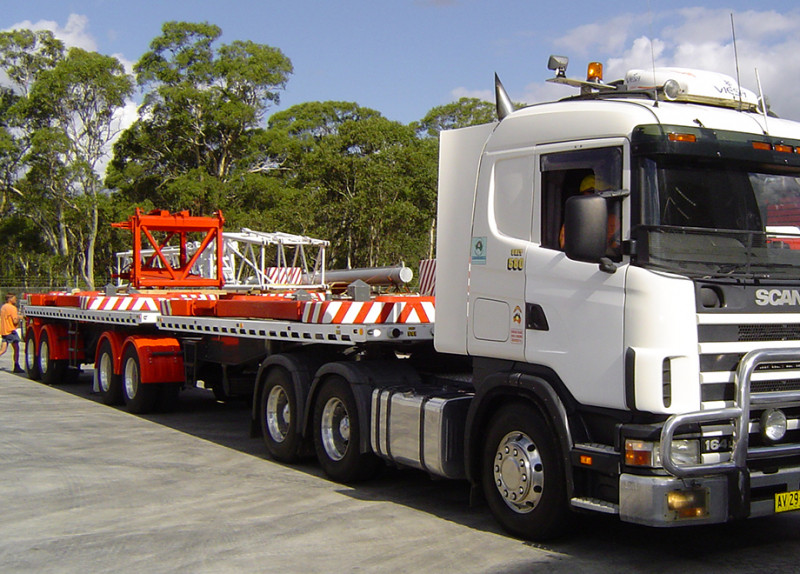
Determine The Type Of Crane You Need
A crane is a machine that is used to move heavy objects by suspending them from a beam. Cranes are available in a variety of sizes and designs, each suited for a specific purpose. In order to determine the type of crane you need, it is important to consider the following factors:
The weight of the load: The weight of the load is the most important factor to consider when choosing a crane. The crane must be strong enough to support the weight of the load, as well as any additional weight from the lifting mechanism.
The size of the load: The size of the load will determine the size and type of crane you need. If the load is large, you will need a crane that has a large lifting capacity. If the load is small, you will need a crane that is smaller and more maneuverable.
The type of load: The type of load you are lifting will also affect the type of crane you need. If the load is fragile, you will need a crane that is designed to handle delicate loads. If the load is hazardous, you will need a crane that is designed to safely lift and transport hazardous materials.
The lifting requirements: The lifting requirements of the load will also affect the type of crane you need. If the load needs to be lifted to a great height, you will need a crane that is tall enough to reach the desired height. If the load needs to be moved horizontally, you will need a crane that is long enough to reach the desired distance.
The operating environment: The operating environment of the crane will also affect the type of crane you need. If the crane will be operated in a harsh environment, you will need a crane that is designed to withstand the harsh conditions. If the crane will be operated in a confined space, you will need a crane that is compact and maneuverable.
Once you have considered all of these factors, you will be able to narrow down the type of crane you need for your project.
Consider The Size And Weight Of Your Load
When you are planning to use a crane to move a load, you need to take into account the size and weight of the load. If the load is too large or too heavy, the crane may not be able to safely move it. This could lead to an accident or injury.
To avoid this, you need to make sure that you know the weight and dimensions of the load before you attempt to move it. If you are not sure, it is always better to err on the side of caution and get a crane that is rated for a heavier load than you think you will need. This will give you a safety margin in case the load is unexpectedly heavy.
Once you have the right crane for the job, you need to make sure that it is set up properly. The crane needs to be level and the load needs to be centered. If the load is not centered, it could swing and hit something, or even tip over the crane.
Once the load is secure, you can start to move it. But even then, you need to be careful. Sudden stops and starts can cause the load to swing, so you need to make sure that you move the crane and the load smoothly.
If you take the time to consider the size and weight of your load, you can avoid accidents and injuries. Make sure you know the capabilities of your crane, and take the time to set it up properly. Then you can move your load safely and without worry.
Choose A Trailer That Can Accommodate Your Load
When it comes to choosing a trailer that can accommodate your load, there are a few things you need to take into account. The first is the size and weight of your load. The second is the type of trailer you need to transport your load. And the third is the type of crane you’ll be using to load and unload your trailer.
If you’re transporting a large and heavy load, you’ll need a trailer that can accommodate that weight. There are a few different types of trailers that can do this, but the most common are flatbed trailers and lowboy trailers. Both of these types of trailers have a low loading height, which makes them ideal for transporting heavy loads.
If you’re using a crane to load and unload your trailer, you’ll need to make sure that the crane can reach the trailer. Most cranes have a maximum reach of about 20 feet, so you’ll need to make sure that the trailer is within that range.
Once you’ve taken all of these factors into account, you can start shopping for trailers. There are a variety of different trailers on the market, so you should be able to find one that meets your needs.
Consider The Terrain Where You’ll Be Using The Crane
When you’re planning to use a crane, it’s important to consider the terrain where you’ll be using it. There are a few things to keep in mind, such as the ground conditions, the stability of the crane, and the type of terrain.
The ground conditions are important to consider because they can affect the stability of the crane. If the ground is too soft, the crane may sink. If the ground is too hard, the crane may not be able to get a good grip. There also might be obstacles in the way, such as trees, power lines, or buildings.
The stability of the crane is also important to consider. If the crane is not stable, it could tip over. The type of terrain can also affect the stability of the crane. If the terrain is uneven, the crane may not be able to stay level.
When you’re considering the terrain where you’ll be using the crane, it’s important to keep these things in mind. By doing so, you can help ensure that the crane is used safely and effectively.
Choose A Trailer That Can Maneuver Easily In Your Work Area
If you’re looking for a trailer that can maneuver easily in your work area, you’ll want to consider a few factors before making your purchase. First, think about the size and weight of the trailer. A heavier trailer will be more difficult to maneuver, so if you have a limited amount of space to work with, you’ll want to choose a lighter model.
Next, consider the type of terrain you’ll be using the trailer on. If you’ll be pulling the trailer on pavement, a model with smaller wheels may be easier to maneuver. However, if you’ll be using the trailer on rougher terrain, such as dirt roads, a model with larger wheels may be a better choice.
Finally, think about the features you need in a trailer. If you’ll be carrying heavy loads, you’ll want a model with a strong frame and plenty of tie-down points. If you’ll be carrying delicate items, you’ll want a model with soft sides to protect your belongings.
No matter what your needs, there’s a trailer out there that’s perfect for you. Take the time to choose the right model and you’ll enjoy many years of hassle-free hauling.
Consider The Type Of Brakes Your Crane Will Need
When it comes to finding the right brakes for your crane, there are a few things to consider. The type of crane you have, the environment it will be operating in, and the loads it will be lifting all play a role in choosing the right brakes.
Disc Brakes
Disc brakes are the most common type of brakes used on cranes. They are reliable and require little maintenance. They can be used in a variety of environments, from indoor to outdoor, and can handle heavy loads.
Drum Brakes
Drum brakes are another option for cranes. They offer more braking power than disc brakes and are less likely to overheat. They are often used in industrial settings where the crane will be lifting heavy loads on a regular basis.
Magnetic Brakes
Magnetic brakes are another option for cranes. They are often used in environments where there is a lot of dust or debris, as they are less likely to clog than other types of brakes. They can also be used in high-temperature environments.
Hydraulic Brakes
Hydraulic brakes are another type of brake that can be used on cranes. They offer more stopping power than other types of brakes and are less likely to fade. They are often used in mining and construction applications.
Pneumatic Brakes
Pneumatic brakes are the last type of brakes that can be used on cranes. They offer good stopping power and are less likely to overheat. They are often used in applications where the crane will be operating in extreme temperatures.
When choosing the right brakes for your crane, it is important to consider the type of crane you have, the environment it will be operating in, and the loads it will be lifting. Disc brakes are the most common type of brake used on cranes and are a good option for a variety of applications.
Drum brakes offer more braking power and are less likely to overheat. Magnetic brakes are less likely to clog and can be used in high-temperature environments. Hydraulic brakes offer more stopping power and are less likely to fade. Pneumatic brakes offer good stopping power and are less likely to overheat.
Choose A Trailer That Can Be Easily Serviced And Repaired
If you are in the market for a crane trailer, there are many things to consider. One important factor is how easily the trailer can be serviced and repaired. You want to choose a trailer that is built with easy maintenance and repairs in mind. Here are some things to look for when choosing a crane trailer.
Ease of Maintenance
One of the most important factors to consider when choosing a crane trailer is ease of maintenance. You want to be able to easily access all of the trailer’s components for routine maintenance and repairs. Look for a trailer with a design that allows for easy access to all areas.
Ease of Repair
In addition to ease of maintenance, you also want to consider ease of repair. You never know when you might need to make a repair to your crane trailer. Choose a trailer that is designed for easy repairs. Look for a trailer with easily replaceable parts.
Quality Construction
When choosing a crane trailer, you also want to make sure that it is constructed of high-quality materials. This will help to ensure that your trailer will last for many years. Look for a trailer that is made of durable materials that can withstand the elements.
These are just a few things to consider when choosing a crane trailer. Choose a trailer that is easy to maintain and repair. Look for a trailer that is constructed of high-quality materials. These factors will help to ensure that your trailer will last for many years.
